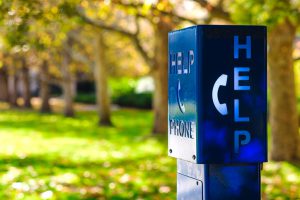
Keeping students safe is a complex issue for campus security officials and administrators. Campuses can cover acres. Students can number in the thousands and the population is constantly changing. Critical communications systems must be prepared to handle massive amounts of ever-changing data. An experienced integrator can help establish campus security best practices in a way that meets current requirements and anticipates future needs.
Special Security Considerations for Campuses
Universities need an enhanced critical communications system because of their unique structure. There are four areas where critical communication issues might arise. Strategic value engineering acts as a solution to these common concerns:
Problem: Large areas
Campuses can span several acres and can be spread out across many unsecured city blocks. This creates challenges for ensuring critical communications systems cover the entire campus.
Resolution
Wireless and IP station options can be used to provide communication systems. These act as solutions even for places without access to telephone lines or power sources. Remote locations are covered through internal and external call-boxes and emergency lines.
Problem: Mixed use
Students live and learn in the same space. The continuous use of the system will not support “down time” for tests, maintenance and emergencies.
Resolution
Any critical communications devices in use will need to offer internal self-testing and maintenance alerts. Full-time use requires full-time management. An integrated system that allows for turnkey operation is vital.
Problem: Rotating population
New students arrive on campus on a regular basis. Graduating students leave. Staff, alumni and visitors will also need access. Keeping track of this rotating population can prove challenging.
Resolution
Critical communications systems should be tied to visitor management software and access control. Schools can easily update notification priorities based on existing databases with integrated software.
Problem: Isolated systems
Even smaller campuses typically employ internal campus security. These individuals handle minor issues before going to outside authorities.This can create an additional step in the event of a serious incident.
Resolution
High-priority problems may not be obvious at first. This results in a dangerous delay. Critical communications can work with systems like shooter detection software, which achieves a faster first response time.
Creating Campus Security Best Practices
Administrators can extend the life of their systems by standardizing their critical communications process. With the guidance of a security integrator, they can implement campus security best practices such as:
- Completing and maintaining an equipment inventory: Many campuses are dealing with disparate locations and thousands of devices. An inventory is an absolute must to ensure all resources are utilized and weaknesses fortified. A full system assessment completed by an electronic security integrator can offer insight. It helps administrators understand what’s available and what’s needed. An automated security integration platform like SiteOwl gives administrators a real-time inventory in one location.
- Determining key personnel and notification hierarchies: Critical communications systems are only as good as their data. Databases for maintaining technology and sending alerts must be created and kept up-to-date. Administrators need to know who is responsible for providing and revoking access. They also need to monitor warranties and establish mass notification hierarchies.
- Planning drills and tests of technology: Administrators must plan for various scenarios like natural disasters or active shooter situations. Running drills helps ensure technology works as expected. Choose security options with built-in self-testing features that issue real-time alerts.
- Regularly reviewing access: A well-run critical communication system allows users to change permissions in one step. This is especially important for high-turnover systems like universities. Make regular checks to ensure system permissions accurately represent the current student body and staff.
It’s best to consult with an outside authority when establishing campus security best practices. Experts in electronic security can often see system issues that administrators haven’t noticed. A security integrator with experience working with universities will be best prepared to deal with the unique communications needs of campuses.
3Sixty Integrated can provide solutions for ensuring the security of your IP cameras from the moment they’re installed and simplify monitoring for needed updates. Call us at (210) 545-1770 or fill out our contact form for more details.

